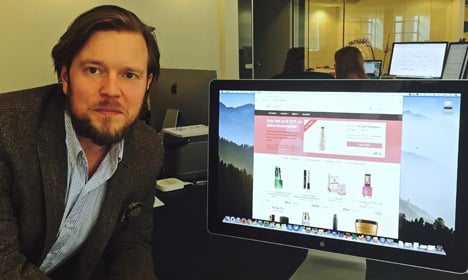JOBS
Entrepreneurship just comes naturally to some
In our new feature series, The Local looks into a successful entrepreneur's life - the story behind their successes, their major challenges and how being an entrepreneur changed them forever. This week, Sparsh Sharma talks to Peter Johan Sønderby-Wagner, co-founder of Luxplus and Freeway.
Published: 15 October 2014 17:39 CEST

Peter Johan Sønderby-Wagner told us that success requires the right combination of hard work, good luck and timing. Photo: Submitted
Some people get bit by the entrepreneur bug, and that is definitely the case with Peter Johan Sønderby-Wagner. The 36-year-old Viborg native took the dating site dating.dk to new heights before recently deciding to pursue a new challenge.
The Local caught up with Sønderby-Wagner to discuss his various ventures, which include the new subscription-based beauty products e-tailer Luxplus and the holding company Freeway, which he co-founded along with two friends back in 1998 when he was just 20 years old. Today, it is behind more than 20 different companies including Lejebolig and the parenting portal Baby.dk.
How did you come up with your latest idea?
I came up with the idea of Luxplus after realising one morning that I didn't want to spend the rest of my life as the CEO of Dating.dk. I had done that job for several years and last year I delivered the best revenue and turnover in the company's history.
After realising I had to move on but still wanting to keep my Freeway ownership and seat on the board, I began writing down the list of criteria for my next startup. It had to be in the B2C segment and it had to involve physical goods, as I had sold only bits and bytes my entire career. It had to involve some kind of subscription, as I master a lot of subscription skills like conversion, retention, simulation and so on.
With these criteria in mind, I did some iterations and eventually came up with the basic idea for Luxplus: a subscription-based webshop that allows customers to pay a low monthly fee (currently 89 kroner), in return for thousands of products from the beauty, personal and hair care industries at a significantly reduced price. On some of our products, the savings are equal to several months of membership fee.
My business partner, Martin Schultz Andersen, and I began our research on this concept in the last few months of 2013 and we launched Luxplus on March 1st.
See also: Entrepreneurs with both sole and soul
What were the initial challenges? How did you overcome them?
Our main concern is still the sourcing of our inventory. A lot of local Danish distributors don't want to supply their products to us because they don't like our low prices. Legally, I don't think they are allowed to do this but luckily we have been successful in building a very strong supplier network throughout the EU, which helps us get the same goods in stock but without the local distributors in the loop. I guess at some point we'll reach such a volume that they won't be able to ignore us any longer.
How has the journey been so far?
It has been quite a ride. Seven months after our launch, we are way ahead of our initial milestones in terms of active subscribers, daily orders and expansion plans for other countries.
How has becoming a serial entrepreneur changed you personally?
If you have the need to build something, you just can't stop. I don't think you can become a serial entrepreneur – it's just something you are. I’m always thinking about my projects, but I also think I have found a good balance between working and spending time with my wife and three kids. If Luxplus turns out not to work, I would definitely get back on the horse and build something brand new.
Your message to budding entrepreneurs?
Keep on working and adapting. Everybody can eventually come up with a great idea but only a few can manage the right amount of hard work and get a little sprinkling of luck plus timing.
Url copied to clipboard!


 Please whitelist us to continue reading.
Please whitelist us to continue reading.
Member comments